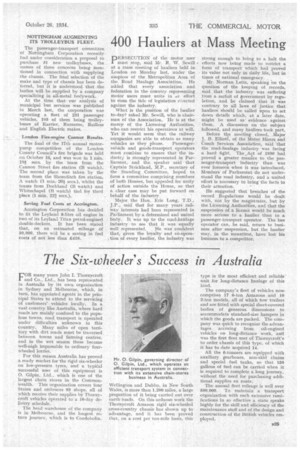400 Hauliers at Mass Meeting P ERSECUTION of the motor user
Page 39

If you've noticed an error in this article please click here to report it so we can fix it.
must stop, said Mr. R. W. Sewill at a mass meeting of hauliers held in London on Monday last, under the auspices of the Metropolitan Area of the Road Haulage Association. He added that every association and federation in the country representing motor users must unite in r effort to stem the tide of legislation directed against the industry.
What is the position of the haulier to-day? asked Mr. Sewill, who is chairman of the Association. He is at the mercy of the Licensing Authorities, who can restrict his operations at will. Yet it would seem that the railway companies are able to obtain as many
vehicles as they please. Passengervehicle and goods-transport operators must combine to ensure that the industry is strongly represented in Parliament, and the speaker said that Captain Strickland, M.P., secretary of the Standing Committee, hoped to form a committee comprising members of both Houses, but appealed for unity of action outside the House, so that a clear case may be put forward on behalf of the industry Major the Hon. Eric Long, T.D., J.P., said that for many years railway interests had been represented in Parliament by a determined and united body. It was up to the road-haulage industry to see that it was equally
well represented. He was confident that, given the loyalty and co-operation of every haulier, the industry was strong enough to bring to a halt the • efforts now being made to restrict a form of transport which had proved its value not only in daily life, but in times of national emergency.
Mr. Norman Letts, speaking 'on the question of the keeping of records, said that the industry was suffering from a surfeit of government by regulation, and he claimed that it was contrary to all laws of justice that hauliers should be called upon to set down details which, at a later date, might be used as" evidence against them. A discussion on the subject followed, and many hauliers took part.
Before the meeting closed, Major J. B. Elliott, of the Motor Hirers and Coach Services Association, said 'that the road-haulage industry was facing a bard fight. The,Ait of 1930 ha,d proved a greater menace to the passenger-transport industry than was ever foreseen when it was introduced. Members of Parliament do not understand the road industry, and a united effort is necessary to bring the facts to their attention.
He suggested that breaches of the record Regulations would be dealt with, not by the magistrates, hut by the Licensing Authorities, and that the suspension of a licence would be much more serious to a haulier than to a passenger-transport operator. The bus operator can, he said, return to business after suspension, but the haulier may, in the meantime, have lost his business to a competitor.




























































































